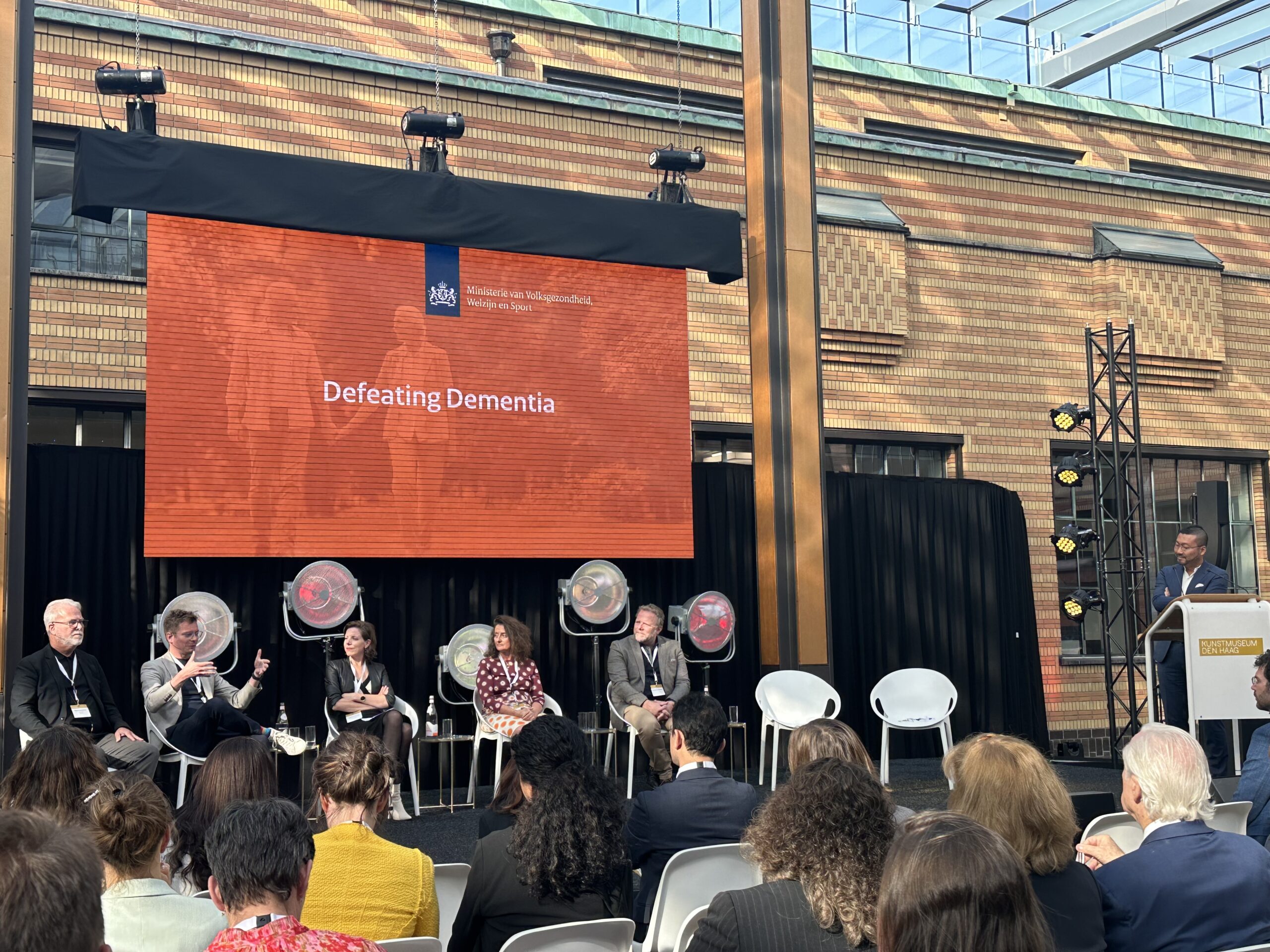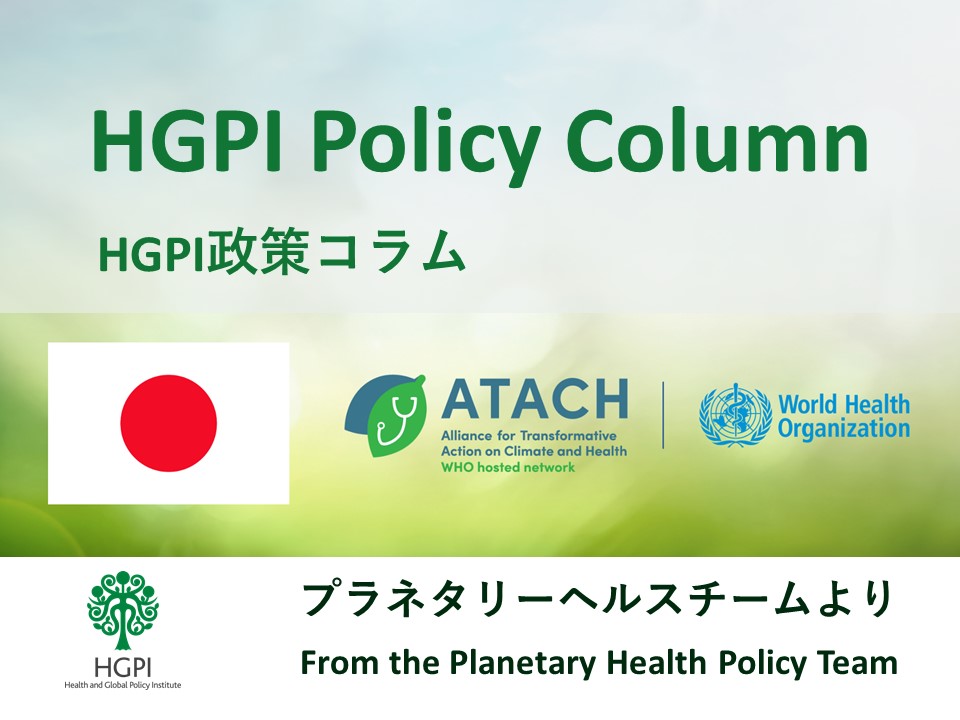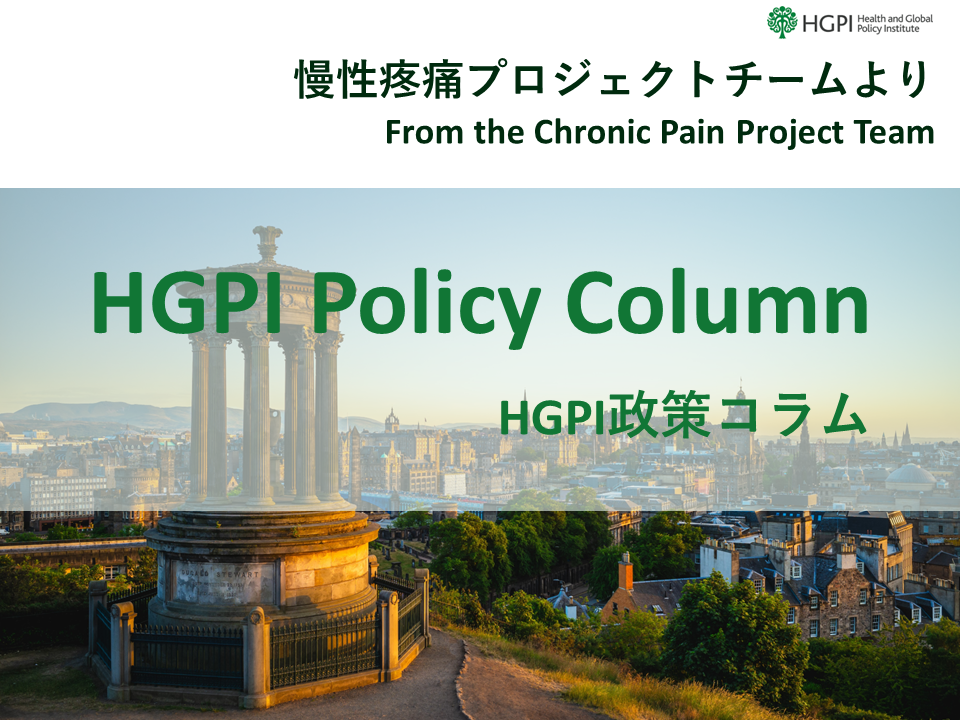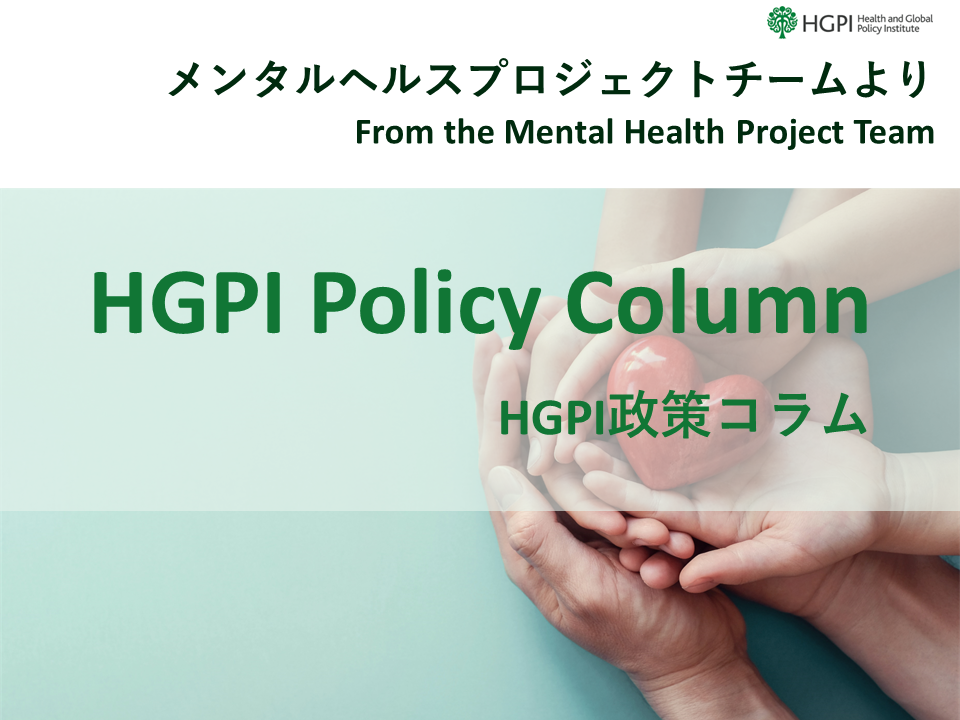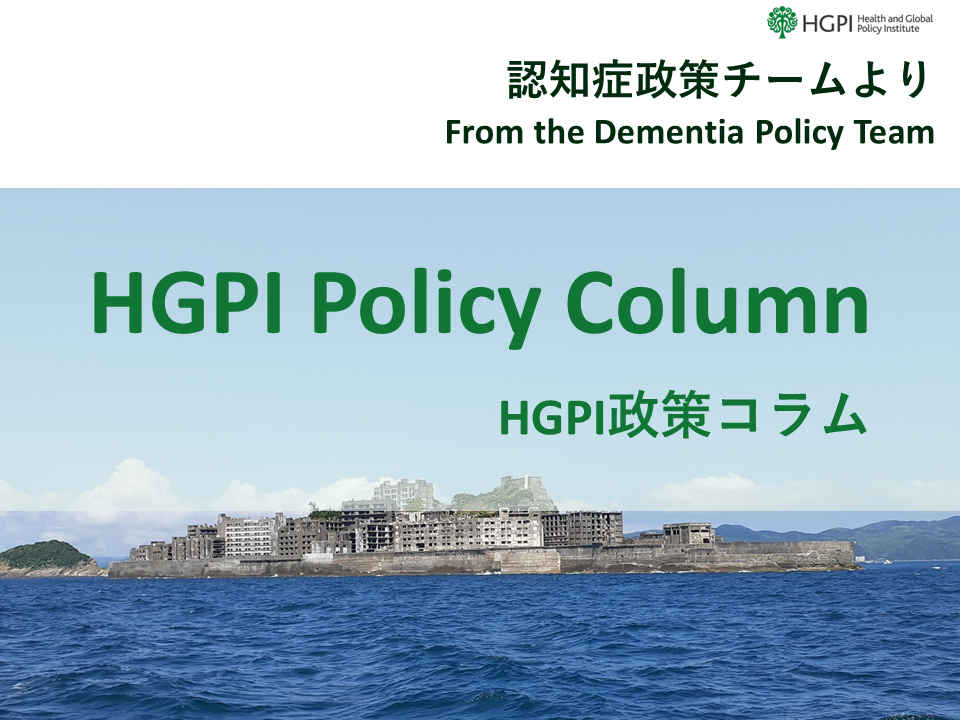[HGPI Policy Column] (No.45) From the Dementia Project “Identifying What Japan Can Deliver to the World Based on Discussions in the International Community”
date : 8/7/2024
Tags: Dementia, HGPI Policy Column
![[HGPI Policy Column] (No.45) From the Dementia Project “Identifying What Japan Can Deliver to the World Based on Discussions in the International Community”](https://hgpi.org/en/wp-content/uploads/sites/2/column-45-top-1.png)
<POINTS>
- In October 2023, a high-level meeting on dementia was held in the Netherlands, where the development of treatments, the need for a symbiotic society, international cooperation and the use of digital technologies were discussed.
- As the G7 chair, Japan hosted a meeting of health ministers in 2023 and led international discussions on dementia. In Japan, the Basic Law on Dementia was passed in June 2023, and efforts are underway to promote a party-centered approach.
- The number of people with dementia is expected to increase rapidly in Asia, and Japan is expected to communicate its efforts to combat dementia and build a symbiotic society through the Asian Health Initiative, and contribute to its realization in other countries.
- The ageing of the population is also expected to continue in the Global South, including Africa, and there is a need to utilize Japan’s experience and support the establishment of support systems for the elderly that are suited to the regional characteristics of each country through the Africa Health Initiative.
Introduction
On Monday, October 2, 2023, the Netherlands government hosted a high-level meeting on dementia that took place in The Hague, Netherlands. The meeting was co-hosted by the World Dementia Council (WDC), an international charity established at the G8 Dementia Summit held in London, England on December 11, 2013. The former Chairman of Health and Global Policy Institute (HGPI), Dr. Kiyoshi Kurokawa (currently HGPI Honorary Chairman for Life), served as a WDC Council Member from its inception until 2023, while current HGPI Chair Mr. Ryoji Noritake, has served as a WDC Council Member since 2023.
To accomplish dementia-related goals set at the London Summit by 2025, the WDC identifies necessary actions for the international community based on circumstances relating to dementia in each country around the world, and works to build, expand, and develop its global network to energize international efforts to overcome dementia.
In the 2013 UK G8 Dementia Summit Declaration, the G8 Health Ministers declared their commitment to or stated:
- The goal to identify a cure or a disease-modifying therapy for dementia by 2025 and to increase the amount of funding for dementia research collectively and significantly in order to reach that goal;
- To increase the number of people in dementia related research studies;
- That they welcomed the UK’s decision to appoint a global Dementia Innovation Envoy, which aims to promote innovation by drawing together international expertise and coordinating global efforts to secure new sources of funding, including exploring the possibility of establishing a private and philanthropic fund to support global dementia innovation;
- To work together, share information about the research that they fund, and to identify strategic priority areas, including sharing initiatives for big data, for collaboration and cooperation;
- To encourage open access, where possible to all publicly funded dementia research and to make the research data and results available for further research as quickly as possible.
The Meeting attendees included government officials from each country, including Japan; people living with dementia and other affected parties, as well as organizations representing them; and representatives of academia and other experts from around the world. The Topics discussed included the current status and prospects for the development of dementia therapeutics, the need for a dementia-inclusive society, frameworks for global cooperation, and the potential of digital technology. After the meeting, the WDC issued the following statement:
2023 THE HAGUE STATEMENT ON DEMENTIA
Japan’s role in the international community
Ten years after the 2013 G8 Dementia Summit, in 2023, Japan served as G7 President and hosted the G7 Health Ministers’ Meeting in Nagasaki Prefecture that May. Regarding the topic of dementia, the G7 Health Ministers’ Communiqué included accelerating efforts with a total package of R&D that includes prevention, risk reduction, early detection, diagnosis, and treatment; delivering evidence; encouraging member states to formulate and implement strategies and action plans utilizing integrated approaches; and promoting the creation of dementia-inclusive communities through multi-stakeholder discussions that include healthcare, long-term care, and citizens, and with involvement from people living with dementia and other affected parties. Japan also demonstrated its commitment to leading global discussions in the field of health by hosting a commemorative dementia symposium to mark the occasion of the G7 Health Ministers’ Meeting in Nagasaki. While all G7 member states face the issue of population aging, its declarations and other documents have not always included an agenda related to dementia. This was the first time such discussions had been held in eight years, since the G7 Kobe Health Ministers’ Meeting in 2016.
On June 14, 2023, Japan enacted the “Basic Act for Dementia to Promote the Creation of an Inclusive Society.” In accordance with that law, plans have been made to advance initiatives that use a person-centered approach, which places affected parties at the center in various settings, such as community development, R&D, and policy formulation. Japan is home to the largest number of people living with dementia in the world, therefore one of its key roles will be to make further progress in domestic dementia policy to achieve G8 and WHO goals. There are also high expectations for Japan to contribute to the creation of a global foundation for continuous discussions on dementia as a priority item on the global health agenda. In the future, Japan must utilize insights acquired over experience and take the actions that only it can take to develop methods of supporting countries in Asia, which are similar to Japan in terms of cultural backgrounds and in the growth of dementia prevalence, as well as to support low- and middle-income countries (LMICs) where the number of senior citizens will increase rapidly in the future.
The number of people living with dementia in Asia has been growing rapidly and is expected to exceed 7 million by 2050, thereby accounting for more than half of all people living with dementia worldwide. In response to these circumstances, a plan was formulated in 2016 called the “Basic Principles of the Asia Health and Wellbeing Initiative,” which aims to achieve broad-based, “Mt. Fuji-shaped” healthcare in Asia. That broad base includes promoting the long-term care industry to meet the needs of aging societies in the region in 2018 and beyond; encouraging cooperation in Asia, such as in human resource development for disease prevention centered on healthcare and long-term care; healthcare services such as those related to healthy diets; and community development to support healthy lifestyles.
As the demand for dementia interventions continues to grow in Asia, we believe it will be necessary for Japan to prepare and disseminate information in Asia regarding initiatives for all aspects of dementia prevention, especially the global challenge of inclusivity for people with dementia. As stated in the Basic Act on Dementia, future dementia policies must set a direction for creating inclusive societies that fully encompass the perspectives of people living with dementia and their families. This means that in addition to developing human resources for long-term care, it will also be essential to share future measures for developing human resources that will be needed for building a broad, inclusive society. Such initiatives should be shared globally to contribute to achieving person-centered care in every country.
In Africa, the proportion of older adults in the total population is still low; however, overall fertility rates are starting to decline in urban areas as those areas experience continuous population growth. This means the number of senior citizens may increase rapidly in the future. However, efforts to establish social insurance systems such as pensions, healthcare, and long-term care have made little progress, and it has been pointed out that people are highly dependent on their households for long-term care and that there are care vulnerabilities at the community level. Steps aimed at addressing health issues in the Global South taken by Japan include the 2019 formulation of the Basic Principles of the Africa Health and Wellbeing Initiative, which are similar to the Asia Health and Wellbeing initiative. These Basic Principles are also based on the concept of achieving broad-based, “Mt. Fuji-Shaped Healthcare,” and aim to build sustainable healthcare while keeping the unique challenges facing Africa in mind.
Japan is characterized by its health systems which enable all citizens to enjoy affordable healthcare and long-term care services, such as its universal health insurance system, the Medical Care System for Older Senior Citizens, and the Long-term Care Insurance System. Japan is also advancing a wide range of dementia measures through the Integrated Community Care System, which is centered on the Government and includes early detection and response as well as support for daily life. In addition to government initiatives, stakeholders like private companies, NGOs, and organizations representing people living with dementia are also engaged in joint efforts to address dementia-related issues. While working to achieve universal health coverage, which is an urgent issue in the Global South, forms of support that are tailored to the characteristics of each country must be examined to build broad-based systems that include activities to support senior citizens from private support organizations and NGOs.
As the country where population aging has advanced the most, we hope that Japan will continue to serve as a leader in various areas for the international community and actively disseminate good examples of dementia policies from public organizations while contributing to global cooperation. We also have high expectations for civil society initiatives that aim to disseminate information on a global scale, such as the Japan Dementia International Exchange Platform operated by Alzheimer’s Association Japan (AAJ).
Column author
Nana Moriguchi (Associate, HGPI)
Top Research & Recommendations Posts
- [Policy Recommendations] The Path to a Sustainable Healthcare System: Three Key Objectives for Public Deliberation (January 22, 2026)
- [Research Report] Perceptions, Knowledge, Actions and Perspectives of Healthcare Organizations in Japan in Relation to Climate Change and Health: A Cross-Sectional Study (November 13, 2025)
- [Research Report] The 2025 Public Opinion Survey on Healthcare in Japan (March 17, 2025)
- [Policy Recommendations] Reshaping Japan’s Immunization Policy for Life Course Coverage and Vaccine Equity: Challenges and Prospects for an Era of Prevention and Health Promotion (April 25, 2025)
- [Research Report] The 2023 Public Opinion Survey on Satisfaction in Healthcare in Japan and Healthcare Applications of Generative AI (January 11, 2024)
- [Research Report] AMR Policy Update #4: Cancer Care and AMR (Part 1)
- [Policy Recommendations] Developing a National Health and Climate Strategy for Japan (June 26, 2024)
- [Public Comment Submission] “Assessment Report on Climate Change Impacts in Japan (Draft Overview)” (December 24, 2025)
- [Research Report] Survey of Japanese Physicians Regarding Climate Change and Health (December 3, 2023)
- [Research Report] The Public Opinion Survey on Child-Rearing in Modern Japan (Final Report) (March 4, 2022)
Featured Posts
-
2026-01-09
[Registration Open] (Hybrid Format) Dementia Project FY2025 Initiative Concluding Symposium “The Future of Dementia Policy Surrounding Families and Others Who Care for People with Dementia” (March 9, 2026)
![[Registration Open] (Hybrid Format) Dementia Project FY2025 Initiative Concluding Symposium “The Future of Dementia Policy Surrounding Families and Others Who Care for People with Dementia” (March 9, 2026)](https://hgpi.org/en/wp-content/uploads/sites/2/dementia-20260309-top.png)
-
2026-02-05
[Registration Open] (Webinar) The 141st HGPI Seminar “Current Status and Future Prospects of Korea’s Obesity Policy: Voices of People with Lived Experience in Policy Promotion” (March 3, 2026)
![[Registration Open] (Webinar) The 141st HGPI Seminar “Current Status and Future Prospects of Korea’s Obesity Policy: Voices of People with Lived Experience in Policy Promotion” (March 3, 2026)](https://hgpi.org/en/wp-content/uploads/sites/2/hs141-top-1.png)
-
2026-02-06
[Research Report] AMR Policy Update #5: Cancer Care and AMR (Part 2)
![[Research Report] AMR Policy Update #5: Cancer Care and AMR (Part 2)](https://hgpi.org/en/wp-content/uploads/sites/2/HGPI_20260204_AMR-Policy-Update-5.png)




